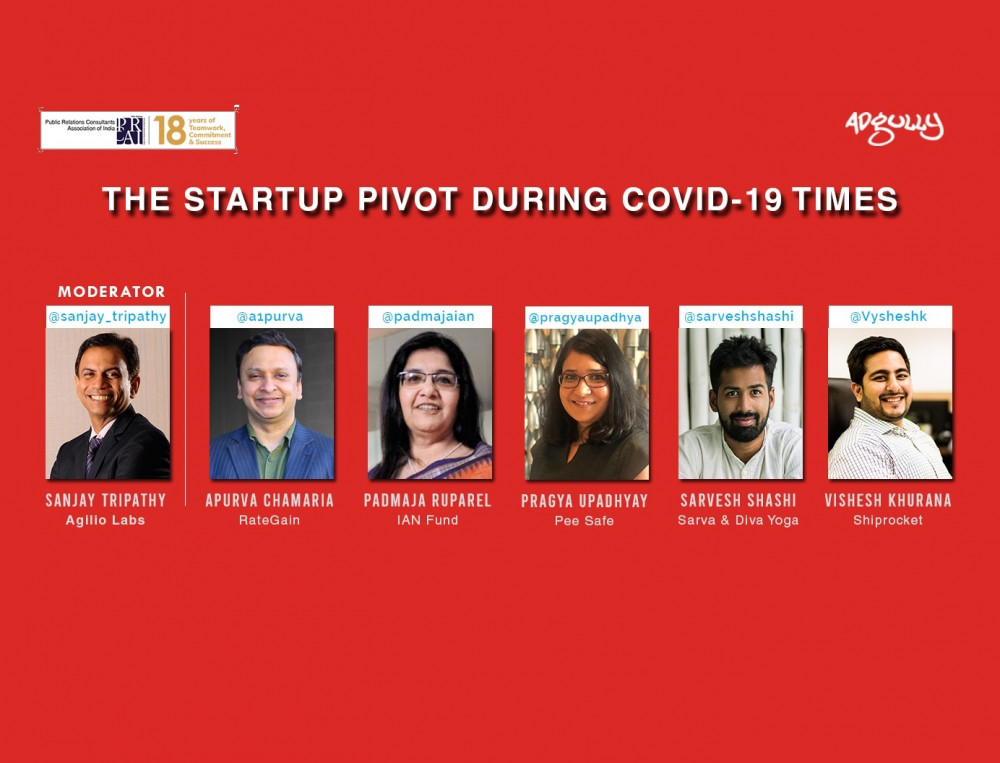Startup pivot – Never let a good crisis go to waste
The COVID-19 pandemic had shaken the startup ecosystem, dried VC funding and forced many founders to re-evaluate their business in a ‘new normal’. Softbank, which had earlier committed to invest another $10 billion in WeWork had reneged on its promise and was being sued by the startup’s founder. Such are the times that we live in.
‘The Startup pivot during Covid-19 times’ was taken up for discussion in the latest episode of Adgully’s #TwitterChat. Held on May 8, 2020, startups, angel investors and accelerators joined the discussions, who keenly observed the forced transformation of the startup ecosystem. The esteemed panelists included:
- Sanjay Tripathy, Co-Founder & CEO, Agilio Labs (@sanjay_tripathy) - Moderator
- Apurva Chamaria, Chief Revenue Officer, RateGain (@a1purva)
- Padmaja Ruparel, Founding Partner, Indian Angel Network Fund (@padmajaian)
- Pragya Upadhyay, Vice President – Growth, Pee Safe (@pragyaupadhya)
- Sarvesh Shashi, Founder, Sarva and Diva Yoga (@sarveshshashi)
- Vishesh Khurana, Co-founder, Shiprocket (@Vysheshk)
To understand the impact of COVID-19 on startups, we needed a bird’s eye view of the sectors that were worst impacted in the aftermath of the pandemic.
Experts agreed that travel, hospitality, retail, real estate, auto, aviation, personal care, food and beverages, consumer durables have all faced the brunt. These are the ‘non-essential’ categories that became least important in the consumer consciousness during the crisis.
They also believed that even in the best-case scenario, it would take at least a year before the economy began to show any signs of recovery. There would be varying timelines for different sectors, however, the combination of recession and pandemic would slow down demand – both domestic and global – for a long time to come.
Top Guest Tweet
Medium term 6-10 months long term 15-20 months.
Apurva Chamaria, Chief Revenue Officer, RateGain shared data from McKinsey that depicted the revival of certain ‘key’ sectors.
#Recovery will happen in different quarters by different sectors. Here is a chart from @McKinsey which some thoughts.. #businesspivot #covid #crisis pic.twitter.com/ojGBWyf5sh
Big business would lead the read to recovery simply because they have a strong ‘Capital Runway’, as stated by Pragya Upadhyay, Vice President – Growth, Pee Safe. Experts agreed that cash reserves would significantly improve the ability of startups to adapt quickly and seamlessly to the scenario.
‘Pivot’ strategy viable for all startups
Apurva Chamaria: All startups don’t need to pivot. Every startup needs to evaluate product-market fit in light of the new normal and decide whether to pivot or go deeper into their existing business model. I would say that never let a good crisis go waste.
Padmaja Ruparel: The key to a successful pivot is thinking in terms of agility, innovation, and resource efficiency. It is time for startups to leverage their competencies. Business plans are living documents and should evolve with markets. Market will remain, customer behaviour may change so adaption is key not revolution. Cash flow, unit economics, top line and bottom line will build the foundation of sustainable companies.
Sarvesh Shashi: I think everybody will have to make multiple changes. Not just their core business model, but also factors like consumer safety, employee wellness, their personal health and so on.
Pragya Upadhyay: A lot of businesses will have to pivot as current situation becomes the new normal. It is important to factor in the long-term impact and alter the business strategy accordingly.
Vishesh Khurana: Startups will shift their focus. Unit economics will be more important than scale and reduced growth rate will be acceptable as its number add up.
Top Guest Tweet
From cash burn to conserving cash, the world of business has flipped over in a jiffy
Considerations before adopting a pivot strategy
Pragya Upadhyay: Any brand that decides to change their business direction has to incur several costs in terms of marketing, production, operations, etc. They also need to get their investors on board with the new brand direction. It is almost like having to re-invent the wheel in a short period of time. A strong tech base can further help.
Vishesh Khurana: A major consideration would be to evaluate current status and cost of the pivot as it might sound like an easy escape but most times it is better to hold ground and wait it out.
Apurva Chamaria: The No. 1 consideration is ‘do they have a team ready to serve in go to market (GTM) around the new pivot?’ The skills required might change as they pivot.
For example, Swiggy had to retrain 25,000 delivery executives to make hyperlocal deliveries through Swiggy Genie.
Padmaja Ruparel: Entrepreneurs need to take stock of changing customer behavior, new market opportunities, new policies, focus on local demand, and think afresh. Marketing spends are set to see a change. The focus will shift from functionality rather than fashion, cost versus price.
Sarvesh Shashi: What will a consumer now want? Understanding a consumer’s need now will be critical.
Vishesh Khurana: Consumer behaviour will change as well demand pattern, buying decisions will be revaluated and impulse buying will go down. Businesses need to brace for increased customer acquisition cost (CAC) and plan ahead.
Mood of investors and VC funding
Padmaja Ruparel: Good solid businesses will raise money. Factors like unit economics, EBITDA, CAC, promoter background, and cash flow focus are all important. Investors have to invest; that’s their business. VCs have been fund raising for 24 months aggressively so they need to deploy. Thus, good companies will continue to raise cash. The government has catalysed early stage VC space through initiatives like Fund of Fund for startups, state and ministry funding. Thus, raising funds may take a little longer, but will continue.
Early stage VCs have to mitigate risk. They need to spread their risks and will invest in new companies, slowly perhaps but surely.
Vishesh Khurana: High burn organisations with low cash reserves will be hard to bailout. VCs will avoid such startups. I think investors will conserve funds for bridge rounds of existing portfolio rather make new investments. Getting fresh funding will be harder than ever and unit economics will play a vital role in evaluation.
Sarvesh Shashi: Investors are definitely conserving cash for their existing portfolio companies. But that being said they are bullish on companies that have strong tail winds with them.
Pragya Upadhyay: Investors will wait and look for more agile and nimble entrepreneurs. VC funding will be important for pivoting as well as for new opportunities.
Apurva Chamaria: VCs will be more careful. Angel funding might go down in short term, but will bounce back. The number of entrepreneurs seeking funding might go up as more and people exit regular employment due to business going through a crisis and layoffs.
Agreeing with him, Ruparel remarked, “In the short-term, Angel funding will slow down, but India’s angel ecosystem is changing. We see full time angels, family offices, and corporate starting. Domestic startup funding is growing. Give it a little time, we will see investment traction.”
Chamaria added here, “Already on the supply side, I am seeing massive increase in founders reaching out for early stage funding and the quality of investors seems to be better as well.”
According to Ruparel, sectors will evolve to next level and look at logistics from on ground players to logistics tech and logistics data/analytics with neuro-linguistic programming. “What used to be ‘nice to have’, has become ‘need to have’,” he added.
Future of Startups
Startups will go bust
Padmaja Ruparel: Startups anyway have a high failure rate. Ultimately, the tough will come out standing at the other end of the COVID-19 tunnel – tougher and ready for a longer run!
Successful Pivot strategies
Apurva Chamaria: Domino’s India delivering ITC Food. Perfume makers making hand sanitizers. Garment makers making masks. Agencies making creative at-home videos. There are tons of examples.
Pragya Upadhyay: Hyperlocal delivery players venturing into e-commerce.
Adding to this, Ruparel said, “This means Swiggy may well have two lines of business – Grocery+ Delivery! But both will leverage their core competency, which is tech-enabled delivery.”
Padmaja Ruparel: Offline music. Edu-tech goes online in less than a week. Robotic solar panel cleaner builds innovative indigenous ventilator for COVID-19 in 6 weeks. UV device for reusing PPEs in 7 weeks.
Founders’ mindset
Sarvesh Shashi: I think every founder should use this as an opportunity. They should all take one step back and rethink their business model, purpose and then play a balanced game of offense and defense.
Vishesh Khurana: Everyone will try some strategy, but the key will be execution. In the chase for new opportunities, a lot of founders often end up destroying value in the current stack. It is important to understand that opportunity is not for everyone.

















Share
Facebook
YouTube
Tweet
Twitter
LinkedIn